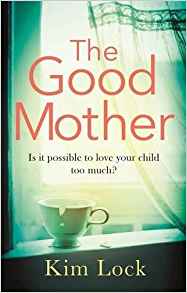
It’s not often that a book leaves me so uncertain.
This was my Mother’s Day gift from my little readers, which was received with pleasure and promoted to the very top of my TBR pile. As the title and blurb suggests, it’s a book about motherhood (very definitely so: the fathers are mostly absent), and yet…it isn’t. It’s a book about depression and abuse and fear and desperation, and while motherhood is the catalyst for these feelings, there’s much more going on than the occasionally mind-numbing erasing of self that can be one result of caring for a very small person.
So what is it about?
The blurb runs something like this:
When devoted wife and mother Jenna Rudolph kills herself, her best friend Fairlie Winter is shocked.
Then Fairlie receives a letter from Jenna, posted before she died.
This sends her on a journey to uncover the truth, which leads her to discover a tale of two desperate mothers and the terrible choices they made for their children.
Fairlie must ask herself: is there such a thing as loving your child too much?
What’s it like?
Interesting. Sad. Frustrating.
I really liked the structure of this. The book opens with Fairlie learning about Jenna’s death, then the narrative switches back and forth between ‘now’, which involves Fairlie discovering what happened to Jenna and Jenna’s mother, and ‘then’, which gradually covers the period between Jenna meeting husband, Ark, and taking her own life. Because we already know WHAT happened, we can focus entirely on the WHY, which intensifies the frustration of missed opportunities.
‘The Good Mother’ offers a fascinating insight into the development of an unhealthy relationship. We witness Jenna’s confusion as she wonders whether she is at fault in various scenarios, but we also witness her clearly addressing the problems…only to be laughed at. It’s not surprising that she mostly learns to put up and shut up…or that this creates a barrage of self-loathing that brings its own problems. Her mixed feelings are one of the most disquieting insights Lock has to offer.
Similarly the presentation of early motherhood is skilfully done. Jenna’s exhaustion, isolation and lack of enchantment with a screaming baby and a food launching toddler is presented in a way that makes the sacrifices motherhood demands extremely clear. This is a real strength of the book: the guilt many mothers feel is sparingly referenced but constantly lurks beneath the surface, ready to pull Jenna down.
‘Jenna leaned against the kitchen counter, rubbing her temples as she watched Henry turn buttered toast into a grain-and-saliva mush on the tabletop. Curds of it littered the floor. As she stared at him, he dropped a mangled crust and, after observing it hit the tiles, he looked straight to her, his features twisting in outrage.’
So why was I frustrated?
In short, I wasn’t always convinced by significant plot points.
I was surprised by the distance between the main characters. Fairlie and Jenna were best friends. Why didn’t Jenna confide in Fairlie about the falling-out with her mother? This just seems implausible. (Speaking of Jenna’s mother – despite the implications of the blurb, what she does is not ‘for her child’ at all. It is for her and it is devastatingly selfish.)
And how did Fairlie not notice things were so deeply amiss with her friend? She works as a nurse – aren’t they trained in spotting depression? Of course, by the time the depression blooms, the two women are already estranged, to a degree, but Fairlie still has a key opportunity, and it’s sad to see her miss it.
I’m also unsure about two key elements of the ending, which involve Ark’s plans and Ark’s fate. I can’t say anymore without introducing major spoilers, but I found the first surprising verging on unconvincing and the second involved a major omission that ought to have been addressed, even if that was done very briefly.
And speaking of omissions…I can’t decide if it’s wonderfully chilling that Jenna is allowed one final secret (surely Ark knows? And the detective must know?) or whether it’s a very very odd omission from the already shocking (but potentially even more shocking) story of her death.
Final thoughts
Despite the omissions and minor frustrations identified, I really did enjoy reading this. It was a genuinely interesting insight into Jenna’s situation and I liked the structure of the narrative, Fairlie’s search for clues and the presentation of motherhood.
If you like the sound of this, read it, (hopefully!) enjoy it, let me know what you think of it.
And whether or not this appeals to you, remember that sometimes friends have a responsibility to ask difficult questions. Please, look after your friends.